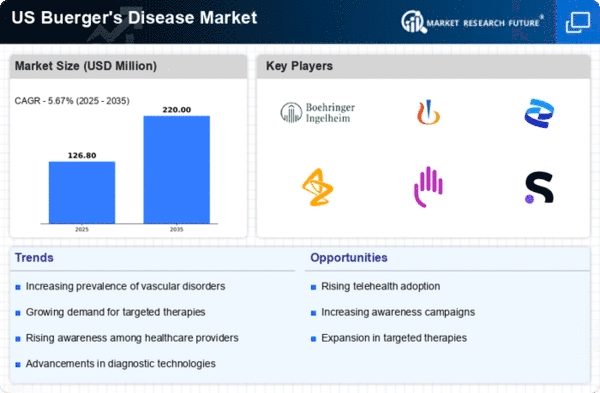Increased Smoking Rates
The correlation between smoking and Buerger's disease is well-established, and the current smoking rates in the US appear to be a significant driver for the Buerger's disease market. Despite various public health campaigns aimed at reducing tobacco use, smoking remains prevalent, particularly among certain demographics. This ongoing trend may lead to a higher incidence of Buerger's disease, thereby increasing the demand for specialized treatments and interventions. The Buerger's disease market could potentially benefit from targeted marketing strategies that address smoking cessation and its impact on disease progression. Additionally, healthcare providers may focus on educating patients about the risks associated with smoking, which could further stimulate the market as more individuals seek medical assistance for symptoms related to Buerger's disease.
Rising Incidence of Buerger's Disease
The increasing incidence of Buerger's disease in the US is a notable driver for the Buerger's disease market. Recent studies indicate that the prevalence of this condition is on the rise, particularly among younger populations who smoke. This trend suggests a growing need for effective treatment options and management strategies. As healthcare providers become more aware of the disease, the demand for diagnostic tools and therapeutic interventions is likely to increase. The Buerger's disease market may see a surge in investments aimed at developing innovative therapies, which could enhance patient outcomes and improve quality of life. Furthermore, the economic burden associated with managing complications from Buerger's disease may prompt healthcare systems to allocate more resources towards research and treatment, thereby expanding the market landscape.
Advancements in Diagnostic Technologies
Technological advancements in diagnostic tools are poised to significantly impact the Buerger's disease market. Enhanced imaging techniques and biomarker identification are improving the accuracy of Buerger's disease diagnoses, allowing for earlier intervention. As healthcare providers gain access to more sophisticated diagnostic methods, the likelihood of identifying cases of Buerger's disease increases. This trend may lead to a greater demand for treatment options, as timely diagnosis is crucial for effective management. The Buerger's disease market is likely to see a rise in the development of innovative diagnostic solutions, which could facilitate better patient outcomes and drive market growth. Furthermore, increased awareness of these technologies among healthcare professionals may contribute to a more proactive approach in managing Buerger's disease.
Regulatory Support for Innovative Therapies
Regulatory bodies in the US are increasingly supportive of innovative therapies for conditions like Buerger's disease. This regulatory environment may facilitate the approval process for new treatments, thereby accelerating their availability to patients. The Buerger's disease market stands to benefit from streamlined pathways for drug development, which could encourage pharmaceutical companies to invest in research and bring new therapies to market. Additionally, the potential for expedited review processes may lead to a quicker response to unmet medical needs, enhancing patient access to effective treatments. As regulatory frameworks evolve to support innovation, the Buerger's disease market may witness significant growth, driven by the introduction of advanced therapeutic options.
Growing Investment in Research and Development
Investment in research and development (R&D) within the Buerger's disease market is a critical driver of growth. Pharmaceutical companies and research institutions are increasingly focusing on understanding the underlying mechanisms of Buerger's disease, which may lead to the discovery of novel therapeutic targets. This trend suggests a potential for breakthroughs in treatment options, which could significantly enhance the quality of care for affected individuals. The Buerger's disease market may experience an influx of funding aimed at clinical trials and innovative therapies, reflecting a commitment to addressing this challenging condition. As new treatments emerge, the market could expand, offering patients more choices and potentially improving their prognosis.
















